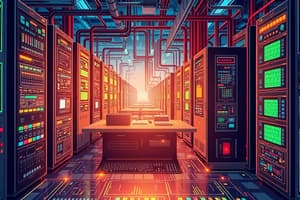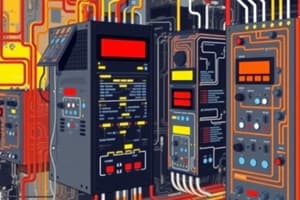Podcast
Questions and Answers
¿Cuál es el componente principal de un PLC?
¿Cuál es el componente principal de un PLC?
- Unidad de Suministro de Energía (PSU)
- Procesador
- Controlador (correct)
- Módulos de E/S
¿Qué función cumplen los módulos de E/S en un PLC?
¿Qué función cumplen los módulos de E/S en un PLC?
- Proporcionar energía al controlador
- Realizar el procesamiento de datos
- Conectar el controlador con otros dispositivos
- Convertir señales digitales a analógicas o viceversa (correct)
¿Cuál es la función de la Unidad de Suministro de Energía (PSU) en un PLC?
¿Cuál es la función de la Unidad de Suministro de Energía (PSU) en un PLC?
- Controlar y monitorear procesos industriales
- Realizar el procesamiento de datos
- Proporcionar energía al controlador (correct)
- Conectar el controlador con otros dispositivos
¿En qué industrias se utilizan los PLC?
¿En qué industrias se utilizan los PLC?
¿En qué industria se pueden utilizar los PLC para controlar la temperatura y la humedad?
¿En qué industria se pueden utilizar los PLC para controlar la temperatura y la humedad?
¿Qué función pueden cumplir los PLC en la industria química?
¿Qué función pueden cumplir los PLC en la industria química?
¿Cuál es uno de los sectores mencionados en el que los PLC desempeñan un papel crucial?
¿Cuál es uno de los sectores mencionados en el que los PLC desempeñan un papel crucial?
¿Qué componentes de hardware forman parte de un PLC?
¿Qué componentes de hardware forman parte de un PLC?
¿Qué lenguajes de programación específicos se utilizan para crear instrucciones lógicas en la programación de PLC?
¿Qué lenguajes de programación específicos se utilizan para crear instrucciones lógicas en la programación de PLC?
¿Cuál es la principal función de los Controladores Lógicos Programables (PLC) en la industria?
¿Cuál es la principal función de los Controladores Lógicos Programables (PLC) en la industria?
¿Cuál es uno de los sectores industriales mencionados en los que se pueden utilizar los PLC?
¿Cuál es uno de los sectores industriales mencionados en los que se pueden utilizar los PLC?
¿Cuál es una de las principales características de la programación de PLC?
¿Cuál es una de las principales características de la programación de PLC?
¿Cuál es la función de los dispositivos de entrada/salida (ES) en relación con los PLC?
¿Cuál es la función de los dispositivos de entrada/salida (ES) en relación con los PLC?
¿Qué tipo de sensores podrían ser considerados dispositivos de entrada/salida (ES) en un sistema PLC?
¿Qué tipo de sensores podrían ser considerados dispositivos de entrada/salida (ES) en un sistema PLC?
¿Cuál es la principal función de los PLC en la industria?
¿Cuál es la principal función de los PLC en la industria?
¿En qué consiste la programación de los PLC?
¿En qué consiste la programación de los PLC?
Flashcards are hidden until you start studying
Study Notes
Programmable Logic Controllers (PLC)
Programmable Logic Controllers (PLCs) are digital computers designed for industrial automation and control systems. They accept inputs from sensors and actuators, process data, and control outputs to specific desired setpoints. PLCs are connected by a fieldbus to sensors, actuators, and input/output (I/O) devices. They are used in various industries, including textile, chemical, automotive, and others.
PLC Hardware
PLC hardware consists of several components:
- Controller: The brain of the PLC, where the processing takes place.
- Power Supply Unit (PSU): Provides power to the controller.
- I/O Modules: Convert digital signals to analog or vice versa.
- Backplane: Connects the controller, PSU, I/O modules, and other components.
- Processor: The central processing unit (CPU) of the PLC.
The main components of a PLC are the controller, input/output (I/O) modules, and power supply unit (PSU). The controller is the heart of the PLC and controls all operations. It communicates with other devices and processes data. The I/O modules convert digital signals to analog or vice versa. The PSU provides power to the controller.
PLC Applications
PLCs are widely used in various applications, including:
- Automation: Control systems, machines, and processes.
- Robotics: Control and coordination of robots and other machines.
- Industrial: Control and monitoring of industrial processes.
- Building Automation: Control and monitoring of building systems.
- Transportation: Control of vehicles, trains, and other transportation systems.
- Medical: Control of medical devices and systems.
PLCs are used to control and monitor various processes in different industries. For example, in textile manufacturing, PLCs can control the temperature, humidity, and other environmental factors to optimize the manufacturing process. In the chemical industry, PLCs can control the mixing and blending of chemicals to ensure the desired quality of the final product. In the automotive industry, PLCs can control and monitor the manufacturing process of cars and other vehicles.
In conclusion, PLCs play a crucial role in industrial automation and control systems. They consist of various hardware components, such as the controller, power supply unit, and I/O modules, which work together to process data and control outputs. PLCs are used in various applications, including automation, robotics, industrial processes, building automation, transportation, and medical systems.
Studying That Suits You
Use AI to generate personalized quizzes and flashcards to suit your learning preferences.




